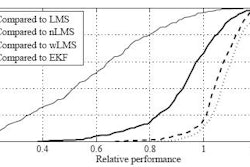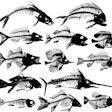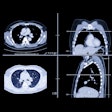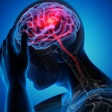
NEW YORK (Reuters Health), Oct 10 - MRI criteria can help identify children with a first attack of inflammatory demyelination who are likely to go on to develop multiple sclerosis (MS), according to a report in the September 23 issue of Neurology.
"After a first CNS demyelinating attack in children, prediction of the further course (especially to clinically definite MS [CDMS] or not) is difficult," Dr. Rogier Q. Hintzen from Erasmus MC, Rotterdam, the Netherlands, told Reuters Health. "MRI can help here: both classical (adult) MS MRI criteria (Barkhof) and KIDMUS criteria are predictive for progression to CDMS."
KIDMUS criteria include "lesions perpendicular to corpus callosum and well-defined, non-large lesions," Hintzen said.
Hintzen and colleagues sought to identify clinical, radiologic, or cerebrospinal fluid (CSF) factors predicting development of MS after a first inflammatory demyelinating attack in 117 children.
Children who scored at least three Barkhof criteria showed a shorter mean time to second attack (45 months) than did children who scored fewer than three Barkhof criteria (123 months), the investigators report, and the presence of at least three Barkhof criteria occurred more frequently in children with diagnosed MS.
Similarly, KIDMUS criteria were present significantly more often in children with MS, and children with KIDMUS criteria had a shorter mean time to second attack (22 months) than other children (143 months).
Both Barkhof and KIDMUS criteria showed a low sensitivity and a high specificity for predicting MS, the researchers note.
"In cases of suspected CNS demyelination, there is reason to rapidly perform a MRI scan, not only for differential diagnosis, but also to help distinguish monophasic variants from the progressive, relapsing variant MS," Hintzen concluded.
"We have an ongoing study in the Netherlands to predict adult MS, a study called PRedicting the OUtcome of a Demyelinating event (PROUD)," Dr. Hintzen added. "We have now linked a PedMS study called PROUD-kids."
"While pathobiological differences presumably distinguish monophasic demyelination from the chronic autoimmunity of MS, the present work highlights that clinical, paraclinical, and MRI features are insufficient to predict MS with certainty," writes Dr. Brenda L. Banwell from The Hospital for Sick Children, University of Toronto, Canada, in a related editorial.
"Such distinctions require discovery of predictive biomarkers, a process that will be aided by international collaborative research efforts," the editorial concludes.
By Will Boggs, MD
Neurology 2008;71:967-973,962-963.
Last Updated: 2008-10-09 17:08:51 -0400 (Reuters Health)
Related Reading
MRI activity and antibody levels chart MS therapy progress, June 11, 2008
Copyright © 2008 Reuters Limited. All rights reserved. Republication or redistribution of Reuters content, including by framing or similar means, is expressly prohibited without the prior written consent of Reuters. Reuters shall not be liable for any errors or delays in the content, or for any actions taken in reliance thereon. Reuters and the Reuters sphere logo are registered trademarks and trademarks of the Reuters group of companies around the world.


















